The diverse films competing in Bafta’s two shorts categories encompass body horror, the Ukraine war, bull-jumping, distressed pets and personal filmmaker excavations. Screen profiles the eight titles vying for the opt-in chapter’s votes
British short film
The Flowers Stand Silently, Witnessing
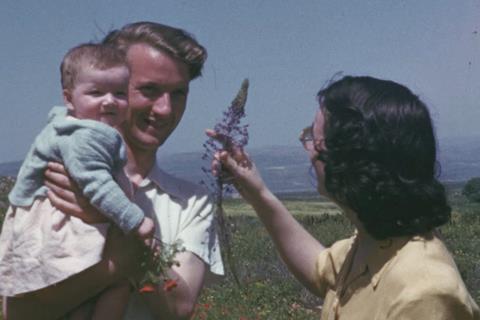
Bafta nominees: Theo Panagopoulos (writer/director), Marissa Keating (producer)
It was a leap of faith that saw Palestinian Greek filmmaker Theo Panagopoulos begin work on The Flowers Stand Silently, Witnessing. While carrying out research for his PhD at Scotland’s Moving Image Archive, the Glasgow-based filmmaker unearthed rarely seen archive footage of Palestine and its wild flowers shot during the 1930s and ’40s.
“I found out the archives weren’t digitised and had been sitting in their raw form for the last 70 years,” says Panagopoulos, who has a Greek father, a Lebanon-born mother and Palestinian grandparents. “As Palestinians, you don’t get to engage with your own history from footage and archives. I thought anything I discovered would be treasure.”
Despite not knowing the quantity or quality of the catalogued 16mm silent-film footage, Panagopoulos applied to Bridging the Gap, a scheme run by the Scottish Documentary Institute and funded by Screen Scotland. Glasgow-based producer Marissa Keating, who had worked with the institute and Screen Scotland previously, wanted to shepherd his vision to the big screen.
Cut together from two archival films — Wild Flowers Of Palestine and The Floral Beauty Of The Holy Land — Panagopoulos penned the written narrative that runs with the footage in English and had it translated into Arabic — in order to frame everything in the present, politically and poetically, and to make audiences wonder.
“I wanted the film to be more fluent than me, because it’s really not about me,” he says. “It’s about people in a collective sense and the land.”
Marion
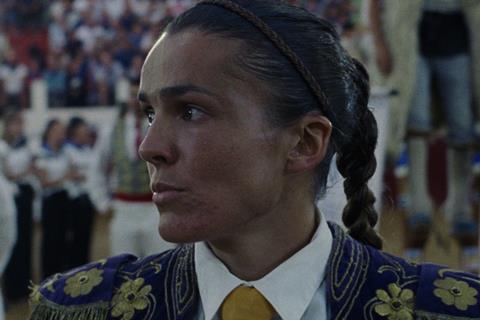
Bafta nominees: Joe Weiland, Finn Constantine (co-writer/directors), Marija Djikic (producer)
After meeting as toddlers, lifelong friends Joe Weiland and Finn Constantine carved out individual careers in the visual arts before teaming up 20 years later to make the short Marion. The pair relocated from London to France to craft the 13-minute film, which dramatises the story of Caroline Nogues-
Larbere, a real-life bull-jumper from near Biarritz, and the sacrifices she makes in a male-dominated sport (a non-violent variant of bull-fighting). It marks the narrative debut for music video and advertising whizz Constantine, while earning Weiland — who has a background in commercials, videos and writing for television — a second Bafta short film nomination following a nod for his debut Gorka in 2023.
Weiland read an article about Nogues-Larbere, contacted Constantine and the pair wrote the script; after having it translated into French and moving to Paris for prep, they secured the participation of Nogues-Larbere. “For us it was Caroline or no-one to star,” says Weiland. “The film relies on reality and authenticity. It was liberating because it forced us to really create an environment on set where it felt natural to do what she does.”
Produced by UK-US cross-media production company OB42 and shot in France over two-and-a-half days during a bull-jumping meet, the duo deployed multiple cameras to capture the action — taking inspiration from Douglas Gordon and Philippe Parreno’s Zidane, a film that follows the movements in real time of footballer Zinedine Zidane during a match. After watching the finished film, Cate Blanchett joined as executive producer alongside Sienna Miller, who had worked with Weiland on Gorka.
Milk
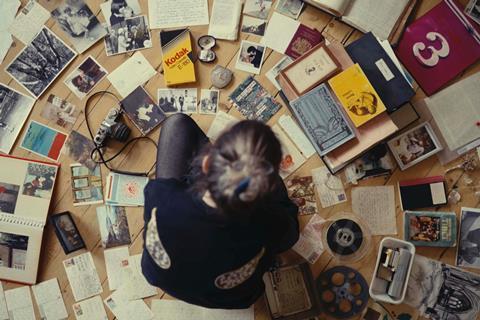
Bafta nominees: Miranda Stern (writer/director), Ashionye Ogene (producer)
Miranda Stern’s Milk took almost a year to make from initial conception in April 2023 to completion in February 2024. Her National Film and Television School (NFTS) graduation short with fellow-student producer Ashionye Ogene, the 27-minute documentary charts Stern’s personal journey to discover the mother she never knew, mixing an investigative and observational style with innovative visuals. “The process was intuitive and collaborative,” says Stern. “I know people often say this, but this film was instinct-based, there was no road map.” By the end of the short, audiences have been invited to ponder family secrets, drug addiction, recovery and motherhood.
Milk was shot in three blocks: at the NFTS Beaconsfield studio, Dean Valley Studios and in Scotland where Stern lives. “It was rewritten in the edit,” notes the filmmaker.
The short has already been nominated for a 2024 best student documentary Grierson award and was selected for the International Documentary Film Festival in Amsterdam. Ogene says she formed an instant bond with Stern and “a definite alignment in how we wanted to approach a documentary”. She had a decade-long career in broadcast journalism and documentary filmmaking before landing at NFTS to study producing.
Stern says one of the biggest challenges for the team was making the disparate elements work together. “The structure constantly needed to be rewritten until it found its rhythm,” she adds.
Stern hopes Milk will help destigmatise discussions about addiction, motherhood and families, and allow audiences to share in that lesson. “From its inception, we aimed for the film to carry a message of survival,” says Ogene.
Rock Paper Scissors
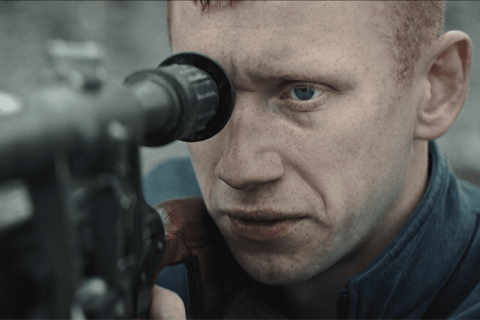
Bafta nominees: Franz Böhm (writer/director), Ivan (writer), Hayder Rothschild Hoozeer (producer)
Writer/director Franz Böhm is clearly emotional as he begins to discuss Rock Paper Scissors, his voice cracking and eyes filling with tears. His NFTS graduation film is inspired by the real story of Ivan, a Ukrainian soldier Böhm met during the young man’s military training in the UK. “I spent five months with him. At some point I asked about the wound in his leg, which was clearly a bullet wound,” recalls Böhm. “He told me this incredible story, which is impressive in itself but also representative of the situation many Ukrainians find themselves in.”
Produced by fellow NFTS alumnus Hayder Rothschild Hoozeer, the drama was shot over 16 days in August 2023 — with north Wales standing in as eastern Ukraine and a former brewery in north London as a field-hospital bunker.
Written in Ukrainian and Russian, Rock Paper Scissors credits Ivan as part of the team, helping Böhm with everything from language and location scouting to advice on the sight and sounds of Eastern European guns and ammo.
“It was an all-Ukrainian cast, even the Russian soldiers were Ukrainian,” says Böhm. Some came directly from Ukraine, some from Germany while others were already based in the UK.
There was no CGI used in the film. “Authenticity was a big topic for us,” says Böhm. Footage of fighter jets was filmed in the war zone in Ukraine by those on the ground. While the project was in the later stages of post-production, Ivan was shot and killed in combat in eastern Ukraine aged 18.
Stomach Bug
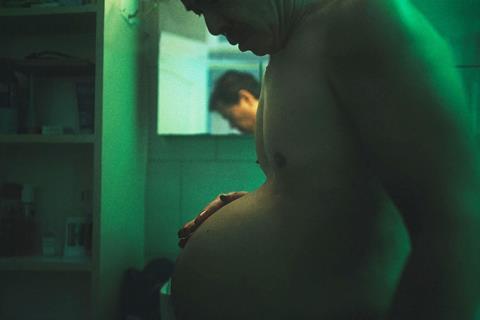
Bafta nominees: Matty Crawford (writer/director), Karima Sammout-Kanellopoulou (producer)
When British Filipino writer/director Matty Crawford first pitched Stomach Bug, his desire was to make a film that would make audiences throw up and cry. Or cry and then throw up. “My favourite cinematic experiences are ones that can move you and get you really emotionally involved in caring about a character while provoking a real physical reaction,” says the filmmaker. “I feel I’m always chasing a cathartic spectacle in my work.”
Stomach Bug portrays psychological discomfort and loneliness via a single father named Manny, played by Cantonese-speaking actor Leslie Ching. His character grapples with empty-nest syndrome after his daughter — only ever heard on a mobile phone — moves out of their home to attend university.
Written and directed by Crawford and produced by his longtime producer Karima Sammout-
Kanellopoulou, both NFTS 2022 graduates, Stomach Bug shot for four-and-a-half days in and around London, and marks the pair’s third collaboration after their first-year film Culling and graduation short White Boy. It is a product of the NFTS and BBC Film Bridge to Industry short-film initiative and spent almost a year in development with the BBC.
“Those development sessions with the BBC helped me articulate things that were subconscious for me and that I didn’t really have the words for,” reveals Crawford. Deciding not to subtitle a key monologue was a big moment. “We had a live audience for that scene because there were extras in the room. Some were tearing up. I thought, ‘Okay, we’ve got what we need.’”
British short film profiles by Stuart Kemp
British short animation
Adiós
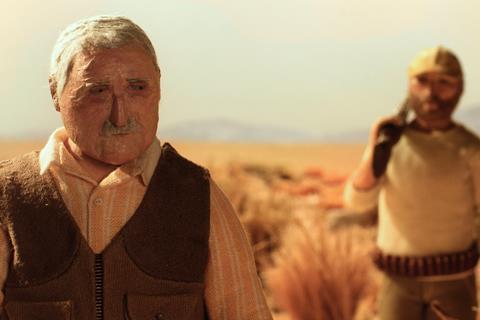
Bafta nominees: José Prats (writer/director), Natalia Kyriacou (writer), Bernardo Angeletti (writer/producer)
The original idea for Adiós — a story about a father struggling to come to terms with his son moving abroad — was one José Prats had first envisioned as a dramatic film.
The Spain native was previously an illustrator at Aardman and is currently at DNEG Animation. He is also the director of several shorts including 2020’s Goya-nominated Umbrellas.
Prats pivoted creatively after going to study directing animation at NFTS, sharing the idea for Adiós with co-writers Natalia Kyriacou and Bernardo Angeletti. The film developed into a more personal story for Prats and marks his first project using stop-motion.
“My co-writers convinced me these stories I was telling them — my relationship with my father, us going hunting in the summer when I was a teenager, memories of my dog — the details that were the most personal, were the best scenery for building Adiós,” says Prats.
“Now every element of the story is rooted and has existed in the real world. It’s my family, my region and our holiday country house that we show in the film.”
With contributions from fellow NFTS students and external animators, the Spanish- language film is a collective artistic effort that Prats and team made over 18 months.
“I poured my soul, every single minute of the day for more than a year into this project,” says Prats, who has caught the stop-motion bug. “It was challenging but I’ve fallen in love with this medium.”
Mog’s Christmas
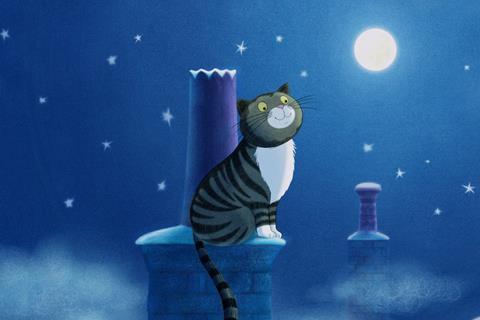
Bafta nominees: Robin Shaw (director), Joanna Harrison (writer), Camilla Deakin, Ruth Fielding (producers)
After making The Tiger Who Came To Tea — an animated adaptation of Judith Kerr’s illustrated children’s book of the same name that aired on Channel 4 over Christmas in 2019 — Lupus Films and the broadcaster have reunited with the same creative partners. Writer Joanna Harrison once more adapts from a Kerr book (1976’s Mog’s Christmas), Robin Shaw directs, while UK animation house Lupus — also Bafta nominated this year in the children’s and family film category for feature Kensuke’s Kingdom — produces.
The hand-drawn and hand-coloured 23-minute film — also streaming on Apple TV+ and Prime Video — follows the story of Mog, the Thomas family’s cat who feels increasingly ignored as Christmas preparations occupy the household. Startled by the arrival of a giant Christmas tree, Mog climbs onto the roof and refuses to move despite the family’s persistent efforts, creating a dismal mood at home.
“There are several challenges in adapting a children’s book, especially a well-known children’s book that people have cherished memories of, like this one,” says Shaw. “But I really like the challenge of taking someone else’s illustrations and breaking it down for animation.” He adds that a personal pull to making such films is “to make an audience of all different ages sit down and enjoy an experience that brings them together”.
Narrated by Adjoa Andoh with a voice cast including Benedict Cumberbatch, Claire Foy and Charlie Higson, the film came together from script to screen in just over a year, with Kerr’s children Matthew Kneale and Tacy Kneale also involved in the development process.
Wander To Wonder
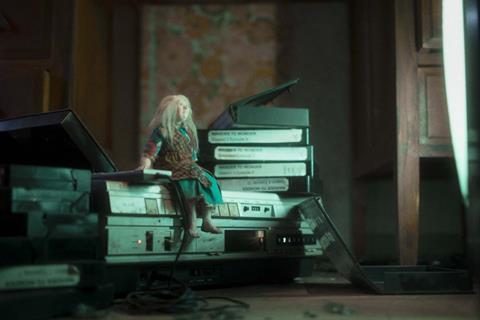
Bafta nominees: Nina Gantz (writer/director/producer), Stienette Bosklopper, Simon Cartwright (writers), Maarten Swart (producer)
Following debut short Zaliger (2010) and NFTS graduation film Edmond — which won the best British short animation Bafta in 2016 — London-based Dutch director Nina Gantz wanted to tell a more ambitious story. She began developing her third short, which over eight years of workshopping became Wander To Wonder. The stop-motion film depicts three oddball characters from the titular fictional 1980s kids TV programme, reacting to the death of the show’s creator in humorous, poignant and bizarre ways, stranded in a decaying studio and making ever-stranger episodes for their ‘fans’.
A co-production between Circe Films, Kaap Holland Film, Beast Animation, Les Productions de Milou and Blink Industries, the 14-minute film faced a number of obstacles in the filming process. Gantz pivoted locations across countries when a producer’s budget dried up and had to be resourceful in the last-minute voice-casting of show creator Uncle Gilly, turning to an acquaintance’s father.
“I still say the fact this film was made and exists is a miracle,” says Gantz. “But through making it I learnt how personal experiences can imbue the development of a story, make it more nuanced with time. I lost someone I used to take care of while making this film, and I now see how my perspective of people grieving differently informed the choices in the final version of the movie.”
Over the past year the film — which boasts Toby Jones among the voice cast — has racked up multiple accolades, most recently winning the short film prize at the British Independent Film Awards and earning Gantz her first Oscar nomination for animated short.
British short animation profiles by Shayeza Walid






![The Brightest SunScreen[Courtesy HKIFF]](https://d1nslcd7m2225b.cloudfront.net/Pictures/274x183/3/5/0/1448350_thebrightestsunscreencourtesyhkiff_312678.jpg)


















No comments yet